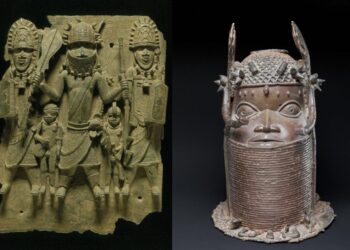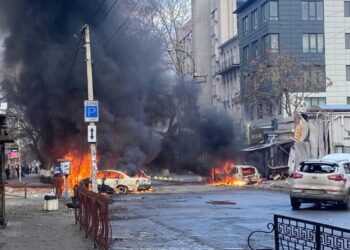
The UK, Germany and France have demanded a credible investigation into the fate of missing Saudi journalist Jamal Khashoggi as international pressure mounts on Riyadh to explain his disappearance.
Khashoggi, a columnist for The Washington Post and Saudi royal insider-turned-critic, went missing after entering the Saudi consulate in Istanbul on October 2 to obtain paperwork that would allow him to marry his Turkish fiancée.
His disappearance has drawn international condemnation and prompted Washington and Riyadh to trade threats, with US President Donald Trump warning of serious retribution if the Saudis are found to be behind his possible death.
“There’s something really terrible and disgusting about that, if that were the case. So we’re going to have to see,” Trump said in a 60 Minutes interview broadcast Sunday, “We’re going to get to the bottom of it and there will be severe punishment.”
Saudi Arabia reacted strongly early Sunday, threatening to retaliate if the US imposed sanctions, with an unnamed official saying the kingdom would “respond with greater action.”
Riyadh later softened its tone.
Saudi Arabia’s stock market fell as much as 7% on Sunday amid fears of sanctions.
The index recovered some ground later to close 3.5% down.
The market’s drop of as much as 9% since Khashoggi vanished has wiped out all the market’s gains in 2018, although it is still up 8% from a year ago.
International companies pull out
Amid the diplomatic fallout over Khashoggi’s disappearance, international firms are pulling out of a high-profile investment summit, the Future Investment Initiative conference, dubbed “Davos in the Desert,” due to take place later this month in Riyadh and to be hosted by Saudi Arabia’s de facto ruler, Crown Prince Mohammed bin Salman.
The latest high profile invitee to say they would not attend the conference was the CEO of JP Morgan Chase, Jamie Dimon, a spokesperson confirmed Sunday.
Turkish authorities believe 15 Saudi men who arrived in Istanbul on October 2 were connected to Khashoggi’s disappearance and possible murder.
At least some of them appear to have high-level connections in the Saudi government.
On Friday, a source familiar with the ongoing investigation told CNN that Turkish authorities have audio and visual evidence that Khashoggi was killed inside the consulate.
His fiancée, Hatice Cengiz, who was waiting outside the consulate, says she did not see him re-emerge.
Saudi Arabia firmly denies any involvement in Khashoggi’s disappearance and says he left the consulate that afternoon. Turkey has called on Saudi officials to provide evidence that he left the consulate.
In a joint statement on Sunday, the foreign ministers of the UK, France and Germany said “light must be shed” on Khashoggi’s disappearance and demanded a “credible investigation.”
British foreign minister Jeremy Hunt on Sunday urged Saudi Arabia to explain what happened to Khashoggi, saying, “if they have got nothing to hide, then they will and should cooperate.”
“If, as they say, this terrible murder didn’t happen, then where is Jamal Khashoggi? That’s what the world wants to know,” said Hunt.
US Secretary of State Mike Pompeo on Saturday declined to confirm whether US Treasury Secretary Steven Mnuchin would still be attending the conference in Riyadh.
“I think we need to continue to evaluate the facts and we’ll make that decision — I talked to Secretary Mnuchin about it last night, we’ll be taking a look at it through the rest of the week,” Pompeo, alongside President Trump, told reporters in the Oval Office on Saturday.
Doubts are also growing over whether British Trade Secretary Liam Fox will attend the Riyadh conference, the BBC reported Sunday citing diplomatic sources.
Arab countries express solidarity
In what appeared to be a coordinated response, a number of Arab countries gave their support to Saudi Arabia. Oman, Bahrain, Jordan, Lebanon, the United Arab Emirates and Egypt all put out statements on Sunday saying they express solidarity with Saudi Arabia.
The Palestinian Authority also put out a statement of support.
In a strongly worded op-ed published later on Sunday, Turki Aldakhil, general manager of the Saudi-owned Al-Arabiya news channel, warned that if the US imposed sanctions on Riyadh “it will stab its own economy to death,” cause oil prices to reach as high as $200 a barrel, lead Riyadh to permit a Russian military base in the city of Tabuk and drive the Middle East into the arms of Iran.
Faisal bin Farhan, a senior adviser at the Saudi Embassy in Washington, DC, said on his official Twitter account Sunday that the op-ed “did not reflect the thinking of the Saudi leadership.”
Riyadh later tried to soften its confrontational tone, with King Salman speaking on Sunday with Turkish President Recep Tayyip Erdogan about Khashoggi’s disappearance.
The Saudi Press Agency and the Turkish state-run news agency Anadolu reported the countries are considering establishing a “working group” to discuss the Khashoggi case.
The Saudi Embassy in Washington offered a milder statement in a tweet on Sunday.
“To help clarify recently issued Saudi statement, the Kingdom of Saudi Arabia extends its appreciation to all, including the US administration, for refraining from jumping to conclusions on the ongoing investigation,” the statement said.
A delegation from Saudi Arabia arrived in Turkey for the investigation into Khashoggi’s disappearance, Turkey’s state-run Anadolu Agency reported Friday.
But last week a senior Turkish official speaking on the condition of anonymity told CNN that the Saudis were not cooperating with the investigation: “They are not open to cooperating.”
Working assumption’ is murder
A US official familiar with the intelligence told CNN that the US had intercepts of Saudi officials discussing a plan to lure Khashoggi back to Saudi Arabia and detain him.
Washington’s “working assumption” is that Khashoggi was killed inside the consulate in Istanbul, according to a US official familiar with the latest intelligence.
“We are pretty clear eyed it is likely to have happened and it didn’t end well,” the official said. The source did caution that this was the latest assessment and no conclusions had been made.
However, last week Trump said he was reluctant to take action, particularly on the issue of arms sales.
“There are other things we can do,” he told reporters at the White House.
The US signed a nearly $110 billion defense deal with Saudi Arabia in May 2017, when Trump made Saudi Arabia a stop on his first foreign trip as president.
The stop was seen, in part, as an endorsement of the strong relationship between Trump, Jared Kushner — his son-in-law and senior adviser — and bin Salman.
Over the weekend a US senior administration official said that the US hasn’t really dealt much with the Turks on the Khashoggi investigation yet because US officials, including the embassy staff, mostly focused last week on repatriating American pastor Andrew Brunson, who was accused of plotting a coup attempt against Erdogan.
Now that Brunson is back in the US, the official said Washington is expecting some information from the Turks. The US also still hasn’t heard anything from the Saudis, and are waiting for some information about what happened, the official said.
The US President said Friday he had not yet spoken with King Salman — bin Salman’s father — in the wake of Khashoggi’s reported killing, but that he planned to “pretty soon.”
–
Source: CNN













